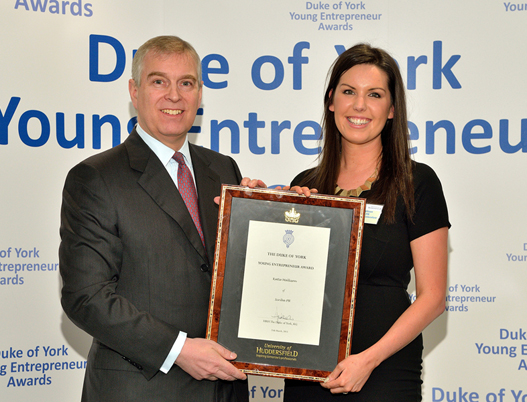Huddersfield in EC report for encouraging enterprise in education
 The University's Chancellor, HRH The Duke of York, KG, is pictured presenting the The Duke of York Young Entrepreneur Award to Huddersfield graduate Katie Mallinson.
The University's Chancellor, HRH The Duke of York, KG, is pictured presenting the The Duke of York Young Entrepreneur Award to Huddersfield graduate Katie Mallinson.
Wed, 23 Sep 2015 10:55:00 BST
“...its entrepreneurship education could be widely emulated and deserves international recognition...”
 A NEW report for the European Commission – designed to show how Higher Education can boost enterprise throughout the EU – uses the University of Huddersfield as a major case study, stating that the key features of its entrepreneurship education could be widely emulated and deserve international recognition.
A NEW report for the European Commission – designed to show how Higher Education can boost enterprise throughout the EU – uses the University of Huddersfield as a major case study, stating that the key features of its entrepreneurship education could be widely emulated and deserve international recognition.
The report’s author, Dr Stefan Lilischkis (pictured below left), employed by the leading German consultancy empirica, paid an intensive two-day visit to the University of Huddersfield, interviewing many members of staff. He has now completed his report and states that the most striking characteristic of Huddersfield’s enterprise education is that the subject is embedded into all of the University’s seven schools.
 “The University of Huddersfield’s strategy provides that by 2018 each student is to encounter enterprise education in his or her study. This approach is enabled by a concept that does not only promote ‘entrepreneurship’ as starting a business but also, more generally, as making ideas happen,” writes Dr Lilischkis in the introduction to his 34-page document.
“The University of Huddersfield’s strategy provides that by 2018 each student is to encounter enterprise education in his or her study. This approach is enabled by a concept that does not only promote ‘entrepreneurship’ as starting a business but also, more generally, as making ideas happen,” writes Dr Lilischkis in the introduction to his 34-page document.
Enterprise education at the University of Huddersfield is a key part of its strategy, writes Dr Lilischkis: “The theme of enterprise and entrepreneurship is promoted at the highest level by the Vice-Chancellor, Professor Bob Cryan, and through the Deans of Schools working with the Research and Enterprise Office.”
He emphasises the “supportive infrastructure” for enterprise education at the University, including an Enterprise Team that aids students and graduates to start their own businesses. Key management appointments at Huddersfield have included a Pro Vice-Chancellor for Research and Enterprise, plus a Director of Research and Enterprise and a Head of Enterprise.
Teachers from non-business schools at the University are encouraged to teach entrepreneurship, states Dr Lilischkis. Also, entrepreneurs and businesses help to shape the curriculum and provide support to students.
The case study finds that the University of Huddersfield plays a vital role in regional entrepreneurship and Dr Lilischkis highlights recent awards that have included Entrepreneurial University of the Year and the title University of the Year. They have meant that the University is well-known in the UK, states the author, and now it deserves greater international attention.
Only two selected in UK
Huddersfield is one of 20 EU universities – and one of just two in the UK – to be selected as the subject of in-depth case studies for a project, backed by the European Commission, named sepHE, which stands for “supporting the entrepreneurial potential of higher education”.
Initially, 50 universities from ten EU countries were identified as potential case studies. This was reduced to a shortlist that included Huddersfield.
“We were delighted to be selected as one of 20 case studies across Europe,” said University of Huddersfield Principal Enterprise Fellow Dr Kelly Smith (pictured), who was one of Dr Lilischkis’s interviewees, quoted in his final report.
“We were also very pleased that Dr Lilischkis highlighted our areas of strength and that we have a particularly innovative approach – that enterprise education is everyone’s responsibility throughout the University,” added Dr Smith.
In his highly-detailed case study, Dr Lilischkis, states that: “Enterprise education at the University of Huddersfield has many characteristics that could potentially be adopted by other universities... one could assume that the approach might work best at universities with a traditional strength in engineering and businesses, just as at the University of Huddersfield. However, the University is also strong at fields that are not obviously linked with enterprise and entrepreneurship.”







